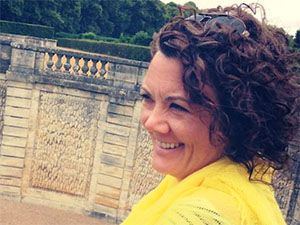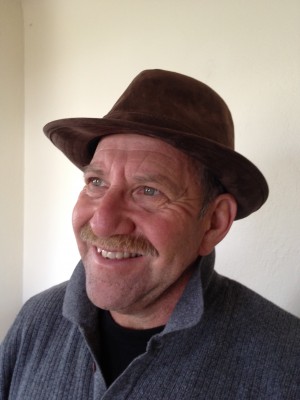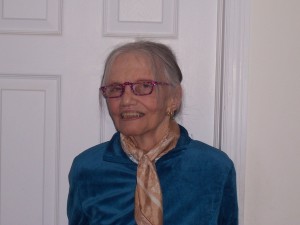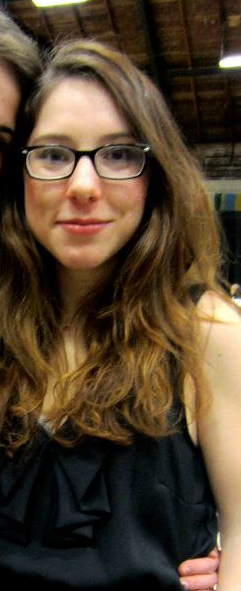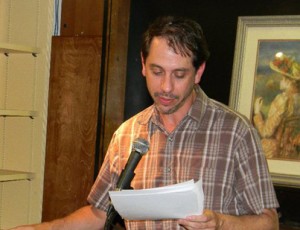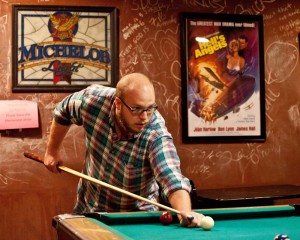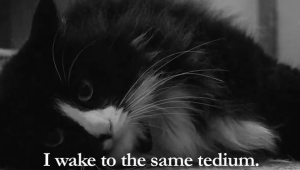This guy I knew, he thought he could make his shit high sticking toluene up his ass. Some people know more than one guy like that. I figure you talk to enough of them you’ll hear just about anything twice.
You stick toluene up your ass and you will not get high. I know you will not get high because of the warnings on the markers. They tell you everything. They tell you not to eat it or inhale it or sniff it or anything. But there is not one warning on any of those markers about inserting toluene into your rectal orifice. Means no one but that guy I knew ever thought of doing that. He invented that and if he sent a letter, said he’d just stuck a watermelon-flavored marker up his ass and got high as a kite, you can bet they would write something to that effect on the package and ruin it for all of us. WARNING: DO NOT INSERT THIS MARKER INTO YOUR RECTAL ORIFICE. IT MAY CAUSE BRAIN DAMAGE.
I tried sniffing toluene. I’ve licked it. I’ve steamed it. I’ve glued it into pebbles and smoked it. I stole a gross of toluene markers from the high school art closet in Fort Dodge once and ate a whole damn box.
They blame the IQ gap on that, which means I walk into a store and the fat guy behind the counter is twenty years older than me and he’s smarter than me because I huffed toluene and he didn’t. I don’t necessarily believe that claim. Why can’t he stop me stealing Cheetos then? Why is he so damn fat?
Honestly, I’ve had it with Armand Assante. You ever had that tension in your jaw where it feels like you’re walking around with a bank safe strapped to your head with a red-assed baboon sitting on top, jumping on your head? That’s what it’s like to be sick of Armand Assante and not be able to do anything about it.
You might say, Well, hell, at least you don’t have to see Assante when you turn on the TV. He’s so bad he’ll never feature in a movie marathon.
That’s worse actually, when you don’t see him, because you can only imagine him.
Years back I sent letters, some pretty bad ones. I shat into an envelope once and removed the turd and outlined the stain with toluene. I sent letters like that to Armand Assante out of a PO box in Waukomis and never heard back.
That was a lie. The first time I got something from Assante that said: Dear Mr. Gregor Mendel, although Mr. Assante doesn’t have the time to answer all his fan mail personally, he reads every letter. He wishes to thank you for your kind words.
And I’d just sent him my shit.
After that I didn’t hear back.
There ain’t no use crying. Ain’t no use laughing either. I laughed at a cop one time and got cited for polluting God’s creation. That was in Ponca City, Ponca Lake Park, and I’d pissed into the water after closing time and he’d seen me. He said there’s people fishing and swimming. Hell, he said, there’s people washing, splashing, cavorting in that water and I’d just relieved myself like a pack animal. Me, I don’t know how I’d got all the way out there to Ponca City if I hadn’t been huffing. When I asked that officer for a ride back to Enid he should have had an idea of my position vis-à-vis self-inflicted brain impairment, how many years I’d been practicing. He agreed to drive me back up the road to where his partner was waiting in a police truck and they ripped up the ticket and got their boots dirty on me. I’ve never been back to Ponca City. I’ve never crossed Route 35 since.
Besides that guy who tries to get his shit high, I got a cousin who sniffs markers. Rondell isn’t a Negro but he gets called a Negro all the time because of his name, even when he’s there with you and you can see he’s white as shit.
Rondell’s worked ten years at Bearing Rubber and Hydraulic coiling hose without fucking himself up yet. That’s because Rondell’s permanently elevated. You want to know what Rondell’s on every day he shows up for a shift? Just open up your utility drawer and pick out anything in a bottle that smells like bad news. Whiteout, rubber cement, silver polish, the fumes from crazy glue. Paint thinner. I’ve seen Rondell snort the blue soap off of Brillo pads. Heavy-duty one-way ticket. You ever want to see a man without a conscience, and I mean literally without because it’s been replaced by pure chemical fumes, just call Rondell. He’s got what you’d call devotion, long-haul endurance. He can fill his whole damn medicine cabinet at The Home Depot.
Me and Rondell, we got into trouble one night before I changed my name. This was hardly a month after they’d let me out of high school and we’d just gone through half a box of Sanford glitter highlighters Rondell’d stole from the Save-A-Lot and Rondell got this yen to steal kung fu robes.
That’s the thing about toluene. You do it steady enough, you sustain that feeling, and your saner oxygen starves. All you’ve got left are the shit-ass crazy molecules.
It was one of those velvety early summer Oklahoma evenings and I knew it wasn’t going to get any better than this. We were sitting there listening to Slayer, getting our asses kicked at Donkey Kong on Rondell’s ColecoVision, and we decided to run out to the Conoco for a breather.
They knew us there at the Conoco but they watched us anyway. Probably if they didn’t and the cameras caught them breathing out their mouths while we was filling up on Slim Jims and Chef Boyardee and half-price Conway Twitty tapes they’d get their own asses fired. Anyway, we had money tonight. Rondell did. He had a job.
Rondell poured himself a Frozen Dr. Pepper bigger than his hands and let it ice the fumes in his head a while. He called this “beezing.” While Rondell beezed, I wondered what the fuck I’d do with myself if I waited five years and let myself become Rondell. Rondell had quite the ego and I was sure he hadn’t even been laid yet. I’d at least gotten my fingers dirty.
Rondell had one of his moments of clarity, what had got him the nickname the Glue Buddha at Bearing’s. He said we ought to steal those kung fu robes and show up at the M&M Bar wearing them. We’d order a round or two in our robes and then put them right back. As if breaking into a kung fu dojo wasn’t bad enough, Rondell thought we’d just mosey on in again and return what we’d stolen. Get it all on camera case they missed us the first time around. Take a shower maybe, eat a can of tuna. That’s how fucked up Rondell was.
I said, “That makes not one bit of sense, Rondell. Even if you plain stole them, what would be the point?”
Rondell’s beezing sometimes gave him this look you might confuse for clear, pointed thinking. If you ask me, he just looks like he’s about to be hit by a car but don’t know it.
He said, “You ever stolen from a black belt before, Clyde?”
“I sure as hell haven’t.”
“You think it’ll make them black belts mad?”
“You bet.”
“You think they’ll beat the shit out of us then? If they catch us?”
“I sure as hell hope not.”
We huffed the rest of those highlighters in Rondell’s Barracuda. If I had to give Rondell any points, it would be there. That car kills. The mag wheels and tooled leather are enough to make you forget who’s doing the driving. We cased the dojo for probably just a little too long. It was obvious no one was inside, and who hits a dojo anyway? Nobody. Rondell.
Rondell said, “You know this dude?”
I knew Bridge Jackson well enough to stay far clear of him. I swear Jackson could beat you up with his stare alone. He was one tough Negro and I respected him and wouldn’t ever have thought about stealing his robes if I hadn’t been junking my mind on highlighters since dinnertime.
We parked way down the road and around the corner so you couldn’t even see Jackson’s dojo from there. Rondell had a roll of plastic garbage bags in the trunk. He always did. If he wasn’t making a mess, he was prepared to clean one up. This time they came in handy.
There was a streetlamp making a pretty big splash out front. We passed under it and cut left to the unlit side of the building. We went over to where Rondell imagined the bathrooms were.
I put a foot up on Rondell’s chicken shoulder and held him like a bowling ball under the ears and he got me up as far as the transom and that was all I needed. I slid right through, and most of my fear steamed off right there. The alarm was the big if and Jackson didn’t have one. I dropped down headfirst onto my wrists and rolled onto a soft canvas bag. Even in the darkness I could see Rondell’s bathroom was the equipment closet.
I got up and tried the door. It was locked from the outside. I called out to Rondell and the big dummy said to try the lights. I knew better and waited for my eyes to adjust. I kept my voice down.
“You dropped me into the equipment room,” I said.
“That’s better than the bathrooms,” Rondell said. “You found those robes yet?”
I’d hadn’t found anything yet but sparring gloves and a sparring mitt. I’d found cakes of toilet soap and plenty of roach killer and some mats on a utility shelf. I zipped open the bag I’d rolled onto and laid my hands on a lady’s wig. Under the wig were lady’s underthings and two short pillows and under the pillows was more money than they had at Liberty Federal for sure, stacked in crisp Hollywood bricks and rubber-banded. It smelled better than buttermilk waffles cooking.
“Throw ‘em up and get on out,” Rondell said.
I hadn’t made any noise for a while, I guess, and Rondell must not have liked that. No one could see him where he was but so what.
I threw a brick of Bridge Jackson’s money out the window and Rondell shut up. I threw out another five bricks, stuffed a few more into my pants pockets, front and back, and packed the bag back up. I’d just had my first clear thought of the evening. If we stole only this much, it would look like an inside job. They’d think it was one of Bridge Jackson’s students or helpers that had got greedy, or his brother Barry, a mean son-of-a-bitch and a natural midget. I tested the metal shelves.
“All clear?”
But Rondell wasn’t answering. I called out again. Then I shut right up.
I’ve learned since that betrayal will always catch you dumb. In another world where I wasn’t trapped in Bridge Jackson’s equipment closet, I’d have said that Rondell didn’t know any better, that he’d beezed away all the sense he’d ever own. But I could see that crack of light under the door now, which meant Rondell’d seen a hell of a lot more than me and he’d left me flat on my ass.
Quiet as I could, I made a go at climbing Jackson’s shelves. I felt like a one-armed monkey. When my head came back out the transom, there he was, pasted to the wall like a window jumper with second thoughts. We had a moment of mutual understanding then, Rondell and me, but I still won’t tell you that Rondell gave a good goddamn and wasn’t mostly frozen into place like a possum in a dumpster. He told me to get the hell down and he held out his chicken arms. As my shoes slithered up and over the window sill the light in the closet popped on and a mean midget voice barked out at the soles of my feet. That voice was crazy as they come with rage.
* * *
A good beeze can last you the whole night if your brain cells are used to it. I told Rondell to stash the money in the trunk, in his tool box. Rondell said ok but when we got to the M&M Bar he wanted to take one brick inside.
“I’m breaking one of them bills,” he said.
“That’s not a good idea,” I said.
“I’m breaking the first hundred.”
“You do that and Jackson’ll sure find out.”
“They break them every week at the One Stop.”
Rondell was right. Most paychecks are spent that way in Enid when Friday rolls around and you’re the king of the whole damn planet. It’s only when you’re lying in bed on Sunday with a broken finger and no medical insurance, no food in the fridge and nothing in the bank, that you remember you work for that money. I let Rondell carry in that brick but I had him promise me he’d peel it in the bathroom, in a stall.
Right away Rondell ordered us a plate of bourbon and beer chasers. He called us over two older ladies to help us out. Now, I was sexed up as usual but I could see that these two women I might think twice about stopping to look at out of sheer curiosity. Sad to say, they were eying us up the same way.
One of them had stringy mop hair and dark mascara that had run but she didn’t know it. She had thin thin lips. The other one was chubby. Names went around. I excused myself politely and left them there to get to know Rondell and see what a fool he was so they’d leave us alone and we could get home.
I ordered a bottle of beer at the bar and I didn’t even get ID’d. I nursed that longneck like a pro, making occasional relaxed eye contact with a better looking catch sitting in the shadows at the crook of the L being bored by her date. I said I was sexed up. Now I felt skittish. I ordered a shot of Wild Turkey, wanting something to happen but not knowing how to make it happen.
She was looking at me regular now and her date wasn’t blind to this. He was a big one and I could tell he’d never huffed a thing in his life. I wondered if he’d already given up on laying her that night and would beat it out of me like those cops in Ponca City had. The creeper next to me knew. He’d already started scooting his stool over towards the cash register. I was this close to sending her over a drink.
A Negro midget with a shotgun might be the funniest thing you see in your whole damn life but hell if you’re going to laugh if you actually happen to see one in a crowded bar taking aim at you. Barry must have been coked up silly busting into the M&M trying to settle up scores with buckshot. Goddamn. I looked everywhere for Rondell, but it seemed Rondell’d made himself scarce.
The bartender had his counter rag out now and he was cleaning his hands. I hadn’t figured he was yellow on account of his size but the boy’d already cleaned them about nine times. Out the corner of my eye I saw that creeper on the barstool again. His creeping had almost gotten him to the cash register. I wished I could have told him to stop that, that if there’s one thing in this world would make Barry more shit-ass crazy than he already was it was an obvious get-away creep.
Then I got mad myself. Here I was barely a month out of high school and I had to shoulder men like Rondell and this creeper, teach them how to behave like men. I’d lost my ROTC interview because I was high on Conoco regular and I wasn’t going to become a marine in this lifetime. It was a straight dotted line from Donkey Kong and Slayer to a case-a-day habit and a crap pension after a forty-year run at Bearing’s that would seem like one very bad month. I could see it all, that this was the best it was ever going to get, and I was so mad at the world I would have fingered Rondell right then and there if he wasn’t in the toilets padding his crotch with bar napkins.
I said, “Barry, I don’t know what you want but we two are going to take this thing outside.”
Her eyes were still on me. I knew they were and it felt like this was too easy, being a man. I was clear-headed and mean as gasoline and ready for the Lord Jesus Christ to knock my ass all the way to China.
I eased off my stool. I winked at her and watched her just about melt under the fear and tension. Even her date wasn’t much of a man anymore that I could see. I winked at him too. I took my time getting over to where Barry was.
Barry and Rondell. Which of them two had a deeper brain fry on that night is idle speculation, but I’d probably have to give Rondell the edge for the kung fu attack he’d been planning in the toilet that whole time. He was still humming from that platter of bourbon and the residuals of his king-sized beeze and I guess he just mixed up his skills. He flew out of the bathrooms on kill mode with a toilet paper headband and blew right up to Barry, but instead of knocking the shotgun out of Barry’s hands, he pickabacked that little man using his shotgun for reins. I swear it was a moment in the history of mankind. I’d never seen anything half as dumb as Rondell and his beezed-out brain cells, so it was another second maybe longer before I even realized that that midget and his single-barrel Snake Charmer .410 were headed straight at me.
What do you feel when you’re staring down the barrel of an oiled shotgun? You feel like your body, your heart and lungs and pretty much everything you are that you can’t see, is inside you and that it is outside you, on the walls and on the floor and ceiling, at the very same time. That you are bleeding to death as you breathe. That in your joints instead of marrow you’ve got trapped cordite and you can already smell it starting to uncurl and sit on the air. What you feel is that you are two places at once and none too good. I put everything I had into keeping my eyes open so I could watch that sonofabitch chamber catch fire and blow my sad ass away.
Kaboom!
Barry missed me by two fat asses. He hit the creeper’s stool instead and blew out the top two rungs and a little chunk of his coward’s ass.
Soon as that happened the M&M jumped back to life. I mean they were all scrambling for a place to stay alive in. Even she was. It was just instinct. She’d dropped into a backwoods squat and now she let out a scream that wouldn’t come. It was like she’d just fallen twenty stories in a dead elevator and her stomach was on backwards and still five floors up. I don’t think I’d felt a damn thing but my heart jump a beat.
That gun went off two more times and when the smoke cleared I could see Rondell’d been burned bad. He’d had his eyebrows singed right off and his nose was peeled raw so that he looked different, almost like a sunburned baby. He’d dropped a steaming load that was just now rolling out his pant cuffs. Barry himself was down, blood trickling from his shiny black forehead. The shotgun had skittered across the wood floor and for a moment no one could find it.
Rondell was still lost in his kung fu daze and I thought they were going to have to slap him to shut him up. He was that fucked up, and I guess he never really recovered. You’d hear later on at Bearing’s about how Rondell’d burst out into the same routine at random, in the supermarket even. For now he just kept whipping up the air with his chops and sideways kicks, maybe until the police came.
Me, I knew those stacks of hundreds in Rondell’s trunk were at least a hundred deep and I grabbed her by the wrist and we made for the Barracuda and took that money and hopped on the first Greyhound bus that wasn’t Kansas-bound.
I changed my name. I stopped sending Armand Assante shit in the mail and I stopped huffing and after the red marks on her wrist healed over we had a little baby girl that I kept when she left me with three months paid up on a vinyl-sided house that was no condo but no goddamn trailer either.
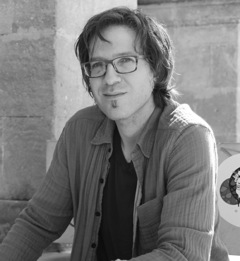 Max Sheridan lives and writes in Nicosia, Cyprus. He wrote features for the Cyprus Mail for a few years—until he was forced to challenge the film critic, a notorious windbag, to a duel. Some of his recent short stories have appeared in DIAGRAM Magazine, the Atticus Review, the Writing Disorder, and most recently, Thuglit. His latest novel, Dillo, is looking for a home. He keeps his work here: www.maxsheridanlit.com.
Max Sheridan lives and writes in Nicosia, Cyprus. He wrote features for the Cyprus Mail for a few years—until he was forced to challenge the film critic, a notorious windbag, to a duel. Some of his recent short stories have appeared in DIAGRAM Magazine, the Atticus Review, the Writing Disorder, and most recently, Thuglit. His latest novel, Dillo, is looking for a home. He keeps his work here: www.maxsheridanlit.com.

